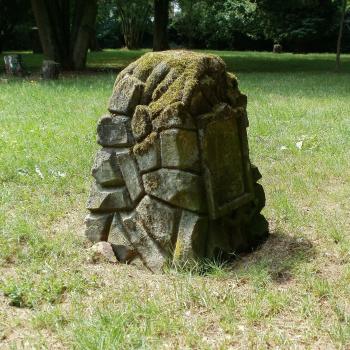I’m one of those fans. I spent a week one summer getting through each Harry Potter book. I power-read. (I’m hoping to work through them again, as well, though in a less speedy fashion. I’ve learned patience.) I spent most of my junior year reading as much fanfiction as I could get my hands on, and even before then I had read so much I would get actual facts in certain stories confused with ones that had been written by fans. I caught the lingo, though it changes (it has been a while since I’ve seen someone say ‘lemon’). I can look at a list of abbreviations and warnings and understand what is being said, whereas someone hoping into the community of fandom would be confused (and end up in dark, dark places – like all of us did).
I swear this connects to Pagandom, I do.
Teo Bishop has a post over on the Wild Hunt about the ‘Pagan Bubble’ and how our lingo is pretty specific. People who aren’t involved have trouble understanding what’s going on.
I don’t think that’s necessarily a bad thing.
When I’m talking to my friends about fanfiction and fandom, we really do have our own language. Anyone who would listen in would be confused. It’s really helpful in that way – some of what we discuss is a tad bit embarrassing – as both a barrier and an invitation. If someone knows what we’re talking about, chances are they’re going to start engaging us in conversation about it. The same thing happens in Pagan and polytheist communities.
We have to, in a way, learn a new language (and depending on your path, you may have to actually learn a new language). We learn the language of the specific path we’re pursuing, and then we might even add in new terms and words. (To bring it back to fanfiction, ‘epilogue what epilogue?’/EWE wasn’t a widely seen term until the publishing of the last Harry Potter book, as far as I can tell.) We become more specific, more detailed, and our conversations become more confusing to those that don’t have the background definitions. It can be dizzying and off-putting to newcomers, at times, but I don’t think we need to start talking to those outside the bubble to be valid.
I do think we should create more beginner friendly resources that are not of a neoWiccish bent, but we’re already seeing some of those pop up. I do think we need to be more conscientious that not everyone has hours to spend researching and we need to rethink how we teach each other and learn in modern Pagandom. But that doesn’t mean the bubble needs to go away.
Having our own words is a good thing.
The bubble might better be referred to as a meeting house. (After all, we don’t all live under the same roof, not even close.) There are conversations families have with each other that would confuse outsiders. Most friends have inside jokes and such. Other religious groups have their own words, and I’m sure confused by most of them. Sometimes, polytheists or Pagans get together to talk, to share food, to yell at each other, sometimes to throw plates, and our conversations are within that house.
There is nothing wrong from talking from within your religion.
Some fanfiction authors get all caught up in trying to write stories that someone outside the fandom will understand, to the point where they explain every little detail that fans already know and that non-fans don’t care about. Talking amongst ourselves is okay. It’s good. If we try to make our words understood by everyone, we’re going to spend more time defining words that have been defined (than we already do) and boring people that want to actually dialog. Every group, every culture, every sub-culture, has specific words and language. The language can even be a mark of belonging or coming home, and that’s a very, very good thing, I think.
(And the Aine you get screaming about ‘FEELS’ is quite different from the one you get who grumbles about ‘heteronormativity in godspousery in modern polytheism’.)
















